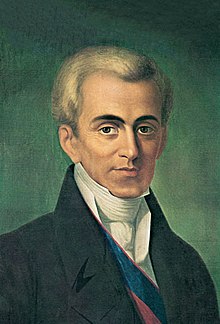John Capodistria
|
His Excellency Ioannis Kapodistrias Ιωάννης Καποδίστριας |
|
|---|---|
 |
|
| 1st Governor of the Hellenic State | |
|
In office May, 1827 – 9 October 1831 |
|
| Preceded by |
Andreas Zaimis as President of the Governmental Commission |
| Succeeded by | Augustinos Kapodistrias |
| Foreign Minister of Russia | |
|
In office 1816–1822 |
|
| Preceded by | Nikolay Rumyantsev |
| Succeeded by | Karl Nesselrode |
| Personal details | |
| Born |
11 February 1776 Corfu, Ionian Islands under Venetian rule |
| Died | 9 October 1831 (aged 55) Nafplion, Greece |
| Nationality | Greek |
| Political party | Russian Party |
| Religion | Greek Orthodox |
Count Ioannis Antonios Kapodistrias (10 or 11 February 1776 – 9 October 1831), sometimes anglicized as John Capodistrias (Greek: Κόμης Ιωάννης Αντώνιος Καποδίστριας Komis Ioannis Antonios Kapodistrias;Russian: граф Иоанн Каподистрия Graf Ioann Kapodistriya; Italian: Giovanni Antonio Capodistria Conte Capo d'Istria), was a Greek statesmen who served as the Foreign Minister of the Russian Empire and was one of the most distinguished politicians and diplomats of Europe. After a long career in European politics and diplomacy he was elected as the first head of state of independent Greece (1827–31). He is considered as the founder of the modern Greek state, and of Greek independence.
Ioannis Kapodistrias was born in Corfu, the most populous Ionian Island (then under Venetian rule) to a distinguished Corfiote family. Kapodistrias's father was the nobleman, artist and politician Antonios Maria Kapodistrias (Αντώνιος Μαρία Καποδίστριας). An ancestor of Kapodistrias had been created a conte (count) by Charles Emmanuel II, Duke of Savoy, and the title was later (1679) inscribed in the Libro d'Oro of the Corfu nobility; the title originates from the city of Capodistria (now Koper/Capodistria) in Slovenia, then part of the Republic of Venice and the place of origin of Kapodistrias's paternal family before they moved to Corfu in the 13th century, where they changed their religion from Catholic to Orthodox and became hellenized. His family's name in Capodistria had been Vitori or Vittori.
...
Wikipedia
